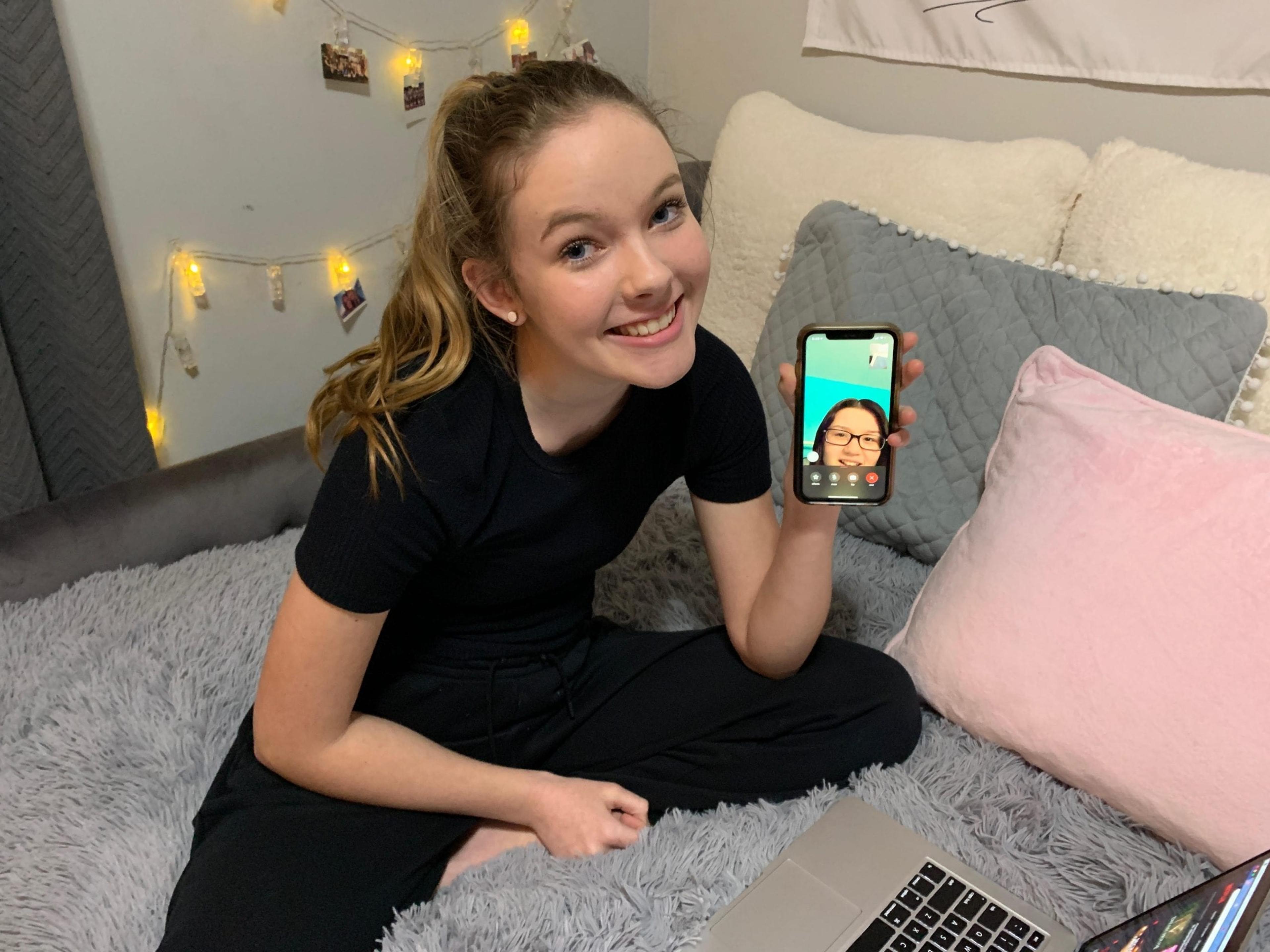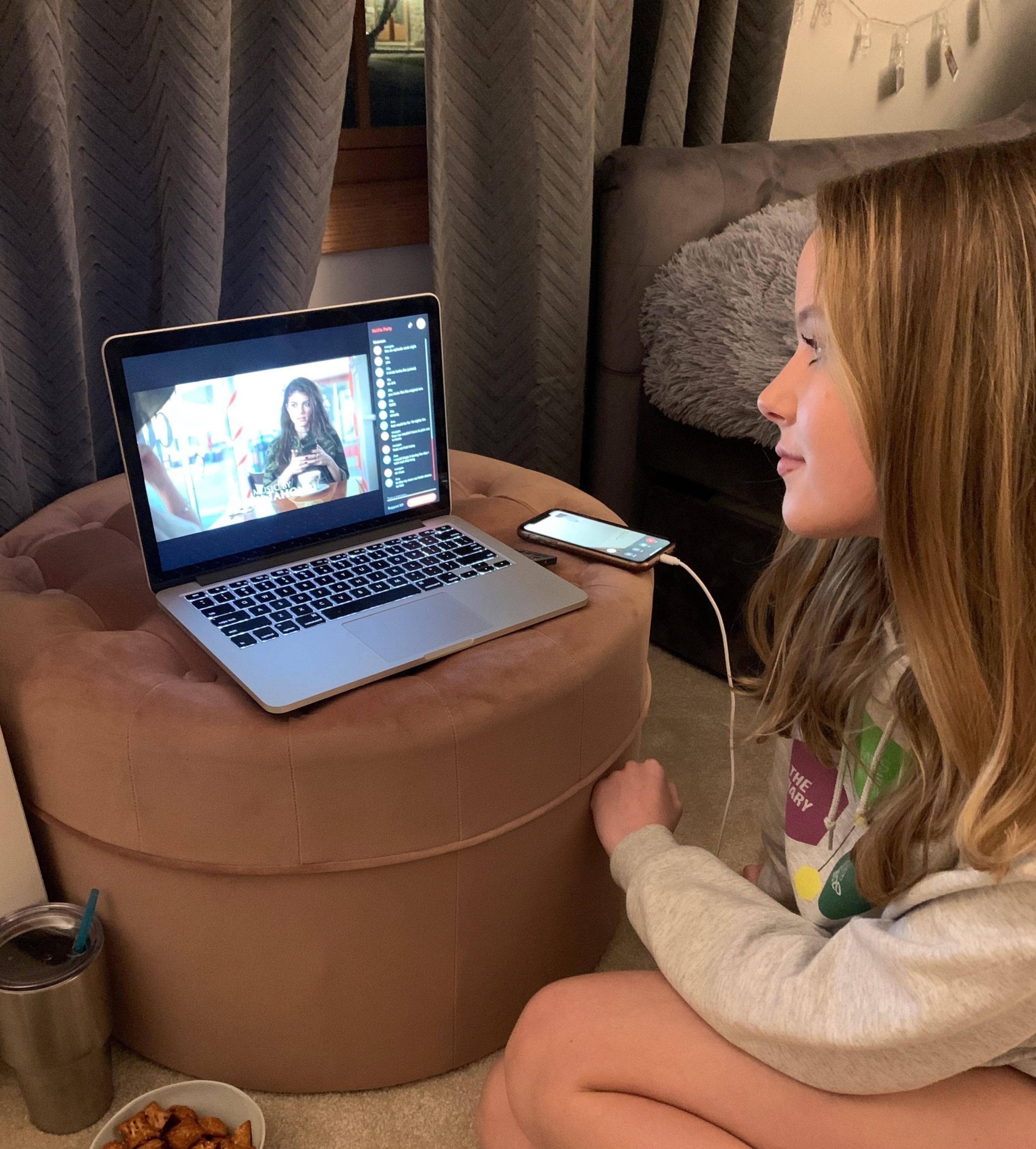Helping Teens Cope Mentally Through the Coronavirus Pandemic
Julie Bitely
| 5 min read

When asked what she’ll do first when school resumes, Lilly DeLano, 14, doesn’t hesitate with her answer. She’ll give all her friends big hugs. That simple desire for human connection is relatable to many. As kids, teens and parents in Michigan and many other parts of the country find themselves in close quarters with one another, it may not be possible to replace the hug of a friend. But, teenagers and members of Generation Z – those born roughly from the mid-1990s to mid-2010s – are uniquely positioned to stay connected with their friends through technology. That’s what DeLano, an 8th-grader from Livonia, has been doing. It’s something that comes naturally. “We use technology every single day in school for every single class,” she explained.

Lilly watching a movie "with" her friends. So far, she and her friends have stayed in touch via a group chat on Snapchat. They send “snaps” and videos to each other about what they’re doing that day and even what they’re making or eating for lunch. “It keeps us occupied and makes us laugh,” she said. Netflix’s Party app lets her watch movies with her friends at the same time – they can simultaneously view and pause what’s onscreen to chat about their favorite parts. Hours-long FaceTime sessions, sometimes lasting into the wee hours of the morning, have helped DeLano feel like she’s with her friends, kind of like a virtual sleepover. And of course, there are the more routine social interactions on TikTok and other social channels that allow her to connect with her extended network of friends over memes, videos and more. DeLano said connecting through different platforms has been a great way to feel close to her friends and pass the time. She’s ready, however, to see them in person when she can. “Sometimes it’s not as fun to be FaceTiming as it could be to be with them in real life,” she said. For parents wondering how to best help their teens through an extended time away from school and their friends and family such as grandparents, here are tips from experts and parents:
- Let them know their feelings are normal. It’s okay to feel sad, anxious or even happy about some time off school. There’s no right or wrong way to process this time emotionally. “The most important thing you can do right now as a parent is to help your kids feel safe. Help them understand this is temporary and that you’re doing everything possible to keep yourself and them healthy,” said Dr. Kristyn Gregory, medical director, Behavioral Health, Blue Cross Blue Shield of Michigan.
- Don’t minimize fears that they or their families could become ill or say there is no possibility, because unfortunately that is not true. - Do let them know you are doing everything possible to keep the family healthy. - Dolet them know if loved ones get sick that they will continue to do everything possible to get better and that doctors, nurses and other health care professionals are working very hard to help make sure those who do get sick will get better again.
- Identify a routine that works for your family. Kids and teens might never admit it to you, but routines and a daily pattern to life can feel reassuring. You don’t have to create a color-coded schedule packed with everything you plan to do during the day but setting some boundaries right now can be helpful. Lilly’s mom Wendie said for her family that’s meant lots of time devoted to baking and cooking, going for walks, reading and art projects completed together. “They don’t need to feel like they’re at school necessarily,” Wendie said.
- Encourage daily movement. “Staying active is one of the most effective ways to stay mentally healthy and to cope with worry, sadness and isolation,” explained Elizabeth Koschmann, TRAILS program director, Department of Psychiatry, University of Michigan Medical School. “If motivation feels low, set a schedule for building in physical activity at the same time every day and find ways to reward even small steps, like watching a favorite show or looking at social media only after you’re done.” For teens, trying an online workout with a friend over the phone or dancing to a favorite playlist could be good ways to shake out their stress.
- Find ways to stay socially connected. Most teens will be savvy about how to connect through social media and other technology (and if they need ideas, Lilly has you covered, above). “Your job as a parent is to set healthy boundaries for using technology. While connection is important, you want to make sure your teens aren’t on their phone 24/7, which can also be unhealthy,” Gregory explained. For tweens or younger kids without their own phone or accounts, reach out to the parents of their friends you know to set up virtual playdates if that’s something they’d like. This is also a good time to work on letter writing skills. Encourage letters to grandparents, cousins, teachers and classmates to stay connected until you can see these special people in person. For teens old enough to spend time online, consider these tips and precautions.
-Stress safe social media. Now is an opportunity to have a heart-to-heart about protecting teens’ privacy online as well as the negative effects of online bullying. Discussing the importance of kindness and reaching out (virtually of course) to peers who may have been less socially connected prior to this can be a great lesson in empathy that will last far longer than the current crisis, Gregory said. - Ask if they have questions. The constant inundation of news kids may see regarding the crisis can be too much and frightening, Gregory said. Being informed is important but should be tempered by time away from the news, and discussion of the facts presented by the Centers for Disease Control and World Health Organization as trusted sources. Most kids and teens are resilient. If you’re noticing any extreme shifts in behavior it could be an indication that your child or teen could use help to manage their feelings. The TRAILS program, which works to improve access to mental health resources in schools, has a comprehensive, online resource guide to help you help them through what can be a confusing time. Related content:
Photos courtesy of Wendie DeLano





